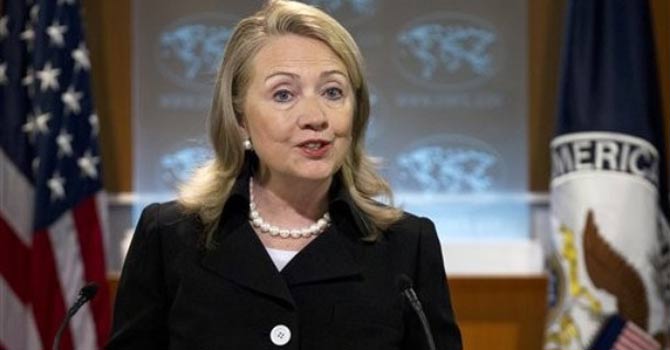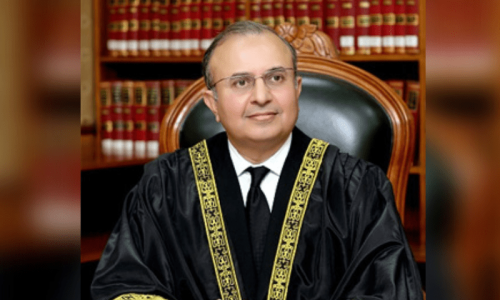
- US secretary of State, Hillary Rodham Clinton (U) urged Pakistan to act against the Haqqani network as well as the LET, noting that the militants had already killed more than 30,000 Pakistanis.— Dawn File Photo
Earlier on Friday, the US media reported that Washington had considered launching retaliatory attacks at terrorist targets inside Fata but concerns about destabilising Pakistan prevented it from doing so.
“We'll take steps necessary to mitigate that threat,” said a White House official, while commenting on AP report.
Asked if the White House could send US soldiers across the border to chase down those militants, White House Principal Deputy Press Secretary Josh Earnest said: “I won't preview the kinds of things that are being discussed, and frankly, whether or not they're even being discussed by the administration.”
But, he said, he could share with the reporters that “this threat is something that we have talked about quite extensively both publicly and privately.”
The White House official pointed out that the US had raised this issue with the Pakistanis and remained committed to finding ways to work with them to combat the threat that these groups posed both to US forces and innocent Pakistani civilians.
Earlier, the commander of Nato forces in Afghanistan said that the deadly attack on the Kabul hotel bore the signature of the Haqqani group which he said continued to operate from Pakistan.
Commenting on the statement, State Department spokesperson Victoria Nuland told reporters in Washington that the United States had been pushing Pakistan for a long time to ‘squeeze’ this terrorist outfit.
Also on Friday, Defence Secretary Leon Panetta indicated that the US was not going to accept Pakistan’s demand for an apology over the Salala incident, which caused Islamabad to block Nato supply routes to Afghanistan.
Pakistan is unwilling to reopen the routes without an apology.
Asked whether he would oppose any further apology, Mr Panetta told the Reuters news agency: “We've made clear what our position is, and I think it's time to move on.”
He added: “If we keep going back to the past, if we keep beating up each other based on past differences, we'll never get anywhere.”
But the most detailed analysis of US-Pakistan relations came in a televised discussion between Secretary of State Hillary Clinton and one of her predecessors, James A. Baker.
Secretary Baker noted that the relationship was in a ‘terrible’ shape, adding that this was “really sad, because for the duration of the Cold War they were our ally, and India was the ally of the Soviet Union, and now all of that is changed”.
Mr Baker disagreed with those who suggested severing ties to Pakistan.
“I think we need to maintain a relationship with them because they’re a nuclear power and because it’s really important that we not see nuclear conflagration in the subcontinent. And we don’t want to see any more proliferation than we’ve seen from Pakistan,” he said.
He suggested cutting off US aid to Pakistan to “get their attention” while maintaining a relationship with them.
Secretary Clinton observed that America’s relationship with Pakistan has been challenging for a long time.
“Some of it is of our own making,” she said, adding that she believed the US should have been more concerned about “what was going to happen to the Pakistanis” after the Soviet withdrawal from Pakistan.
“First of all, I completely agree it is not in our interests to cut off our relationship,” she said while explaining her approach. “It is in our interest to try to better direct and manage that relationship.”
She said there were several things that the US was now asking the Pakistanis to do: “Number one, they’ve got to do more about the safe havens inside their own country” because “the extremists have an ace in the hole. They just cross the border; they get direction and funding and fighters, and they go back across the border.”
She urged Pakistan to act against the Haqqani network as well as the LET, noting that the militants had already killed more than 30,000 Pakistanis.
“Secondly, they have to be willing to recognise that as we withdraw from Afghanistan, it is in their interest to have a strong, stable Afghan government” and they should stop “doing everything possible to try to undermine it.”
“And at the very least, they ought to stop double-dealing us,” said Secretary Baker. “Yeah, at the very least,” Secretary Clinton agreed.
“And they should release Dr Afridi,” she added.










































Dear visitor, the comments section is undergoing an overhaul and will return soon.